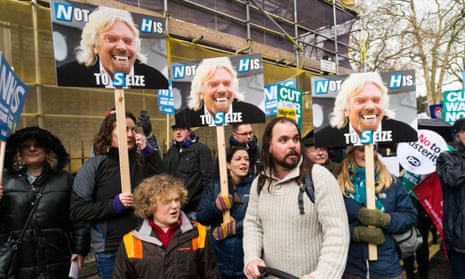Virgin has been awarded almost £2bn worth of NHS contracts over the past five years as Richard Branson’s company has quietly become one of the UK’s leading healthcare providers, Guardian analysis has found.
In one year alone, the company’s health arm, Virgin Care, won deals potentially worth £1bn to provide services around England, making it the biggest winner among private companies bidding for NHS work over the period.
The company and its subsidiaries now hold at least 400 contracts across the public sector – ranging from healthcare in prisons to school immunisation programmes and dementia care for the elderly.
This aggressive expansion into the public sector means that around a third of the turnover for Virgin’s UK companies now appear to be from government contracts.
While some of Virgin’s UK subsidiaries have little of the parent company’s cash, others are wholly owned by Branson’s Virgin Group Holdings Limited, based in Road Town, Tortola.
Though there is nothing untoward about the arrangements, the growth of the company, the lack of transparency over the contracts is beginning to raise concerns among campaigners.
Last year, it won a cash settlement from several NHS trusts when it took court action over a children’s services contract in Surrey, with details of the £2m payout only revealed recently in their accounts.
Sara Gorton, the head of health at the trade union Unison, said: “The company has been so keen to get a foothold in healthcare, it’s even been prepared to go to court to win contracts, moves that have cost the NHS dearly.
“While the NHS remains dangerously short of funds, taxpayers’ money shouldn’t be wasted on these dangerous experiments in privatisation.”
One former surgery manager who spoke to the Guardian said Virgin appeared to be paid more for doing less in her area, although the company said “because the contracts are generally not directly comparable, we don’t believe it to be true”.
Guardian analysis reveals the way the company that began selling records in the early 1970s has diversified in a bewildering way over recent years.
While Branson has focused on his high-profile efforts to put tourists into space, his businesses have been hoovering up low-profile contracts in unusual places, taking advantage of changes to the NHS that have forced local service providers to consider private companies.
The services include:
- A nine-year contract to provide sexual health services for councils in the north-east of England
- A £700m deal to run district nursing, dementia care and support for vulnerable children in Bath and north-east Somerset
- A contract to run GPs’ surgeries in Essex
- A partnership to deliver ‘startup’ loans for the government
- Healthcare, including dentistry, in a number of low-category prisons
- A contract with NHS England to give school flu jobs in Devon.
Precise details of all the contracts are difficult to establish because neither the Department of Health and Social Care or NHS England keep a centralised record.
Virgin’s first foray into healthcare was in 2008 when it announced plans for six branded clinics offering a range of services. However, it was only in 2010 when it bought a stake in an existing provider, Assura, that it began to show greater ambition in the market.
Since then, Virgin Care Services Ltd has bid for – and won – dozens more.
In March 2017, it had almost 1,200 staff - a five-old increase from the year before. Over the same period, its turnover increased from £133m to £204m and its operating profit rose from £7.3m to £8m.
Though healthcare is a growing part of the group, Virgin still appears to make most of its money from transport.
Virgin UK Holdings, the UK business which holds its rail and healthcare ventures, reported revenues of £1.5bn in 2016 and paid £22m in tax.
Earlier this year, Virgin Trains had its west coast line franchise extended for another year.
That deal netted Virgin and its partner Stagecoach £47m in dividends in 2016-17. In the same year the government made an allocation of £117m to Network Rail for the upkeep of the track used by the West Coast line franchise.
Virgin Care told the Guardian it was not making a profit and its focus was on “improving patient and employee satisfaction and saving the NHS and local authorities millions”.
A spokesperson said: “Virgin has created multiple billion-dollar companies across the globe ... which are not connected in any way to government procured contracts.”
“Virgin Care accounts for less than 1% of the Virgin Group’s value and has not made a profit to date. Richard has pledged that if and when he could take a dividend from Virgin Care he will put 100% of that money back into the NHS, with frontline employees deciding how best to spend it.”
Paul Evans, the director of the campaign group NHS Support Federation, said: “Virgin Care are the biggest private sector winner to emerge out of the NHS experiment with competition and outsourcing.
“We don’t know the final shape of it, but players like Virgin and Care UK clearly see a big opportunities for business to continue to deliver clinical services for the NHS.”
- This article was amended on 9 August 2018. An earlier version referred to a government payment of £117m to the Virgin/Stagecoach West Coast line franchise. To clarify: that figure was an allocation to Network Rail for the upkeep of the track used by the line.
